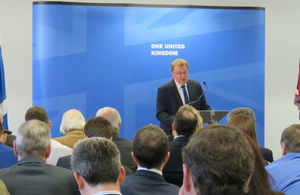Mundell hails dawn of Holyrood 2.0
╗╩╣┌╠Õė²app Secretary of State for Scotland David Mundell said the coming year will see the creation of what will amount to ŌĆ£a new Scottish ParliamentŌĆ�.

Secretary of State for Scotland David Mundell: ╗╩╣┌╠Õė²app coming year will see the creation of what will amount to ŌĆ£a new Scottish ParliamentŌĆ�.
Speaking at the Dovecot Studios in Edinburgh on Monday, he said the Scotland Bill, which is expected to receive Royal Assent within months, would enact the biggest transformation of powers in the history of devolution in the UK.
And, in his speech, entitled ŌĆś╗╩╣┌╠Õė²app Year Of A New Scottish ParliamentŌĆ�, Mr Mundell said the time has now come for all political parties to be ŌĆ£up-frontŌĆ� with the public about how they would use those powers to help people at all stages of their lives and increase their life chances.
He added:
With major new powers being devolved to that Parliament in the Scotland Bill ŌĆ� which by the time of the Scottish elections should be an Act ŌĆ� there will be many more decisions for which it will be responsible. Decisions that will affect the daily lives of everyone in Scotland.
╗╩╣┌╠Õė²app Scottish Parliament will see a huge increase in its financial accountability to the people of Scotland. ╗╩╣┌╠Õė²app major new powers of tax, welfare and other matters will give added weight and effectiveness to the powers it already possesses.
So significant are the changes to its powers, and so immense the potential for their use, the Scotland Bill will create, in effect, a new Scottish Parliament.
In tech-speak, you could say that this will be ŌĆśHolyrood 2.0ŌĆ�.
╗╩╣┌╠Õė²app Scottish ParliamentŌĆÖs new devolved powers:
Mr Mundell also spelled out in some detail how the changes would affect the Scottish public.
On Income Tax, he said:
╗╩╣┌╠Õė²app Scottish Government elected in May will be able to set a budget in the new Scottish Parliament that reflects the devolution of income tax on earnings. It will be able to set a zero per cent rate, effectively increasing the personal allowance for Scottish tax payers, if it chooses to do so. It could introduce a 50 per cent tax rate, or new bands and rates altogether. Whatever the Scottish Government decides, it will have unimpeded power to do so, but it will need to explain to people how it will fund this and what the impact will be.
In regard to the Welfare powers, he said:
╗╩╣┌╠Õė²app Scottish Parliament will be able to help people at all stages of their lives. A broad new power was agreed as the Scotland Bill left the House of Commons. It will allow the Scottish Parliament to create new benefits in devolved areas, and the Scottish Government will be responsible for running and paying for any of these new benefits created under this power. This gives the freedom to design and deliver welfare provision that is specifically tailored to the needs of the people of Scotland.
If they so decide, they will be able to vary the frequency of Universal Credit payments, make housing costs payments direct to landlords and split payments between couples.
╗╩╣┌╠Õė²app new Scottish Parliament will have the freedom to create its own longer-term programmes to support some of the hardest people to help ŌĆ� those furthest from the labour market.
Mr Mundell also highlighted a number of other areas where Scottish ParliamentŌĆÖs powers will be significantly enhanced.
He said:
Holyrood will see its role increase with the devolution of the licensing of onshore oil and gas extraction in Scotland.
╗╩╣┌╠Õė²app devolution of consumer advocacy and advice will enable the Scottish Parliament to implement a Scottish model to provide information and guidance to pursue complaints relating to consumer matters, electricity, gas and postal services.
It will have the power to require public authorities to consider how their decisions might help reduce social and economic inequalities, and to introduce gender quotas for public sector boards.
ŌĆ£A number of bodies relevant to Scottish public life will become more accountable to the Scottish Parliament. ╗╩╣┌╠Õė²appre will be a formal consultative role for the Scottish Parliament in setting the strategic priorities for OFCOM for its activities in Scotland. And for other issues as varied as broadcasting, energy and transport, the Scottish Parliament will be better able to hold bodies to account on behalf of the Scottish people.
If anyone is of the view that things havenŌĆÖt really changed, they only need to look at the kinds of issues the new Scottish Parliament will be grappling with. ╗╩╣┌╠Õė²app new Parliament will have a very different job to do, when compared with its predecessor.